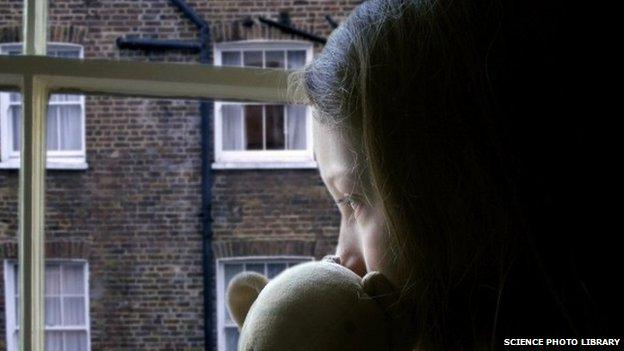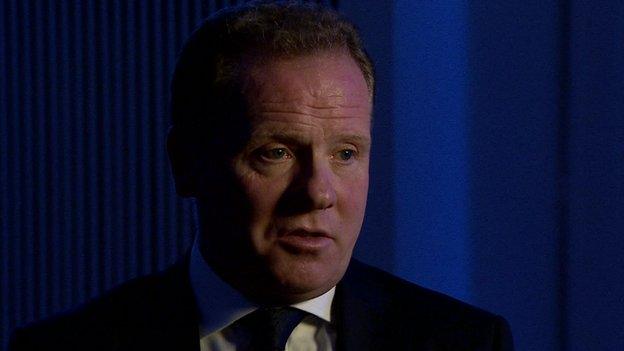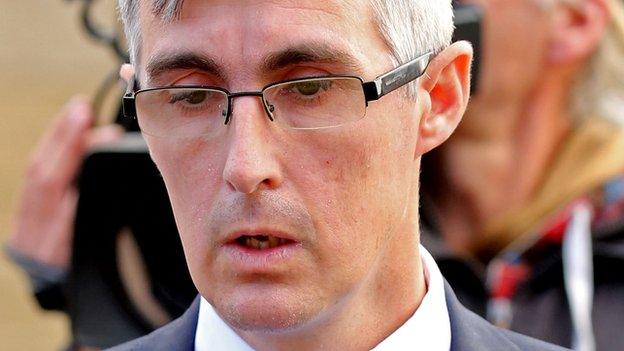Ceop failures leave children at risk, former employees say
- Published

Children are being put at risk by deficiencies at the Child Exploitation and Online Protection Centre (Ceop), former staff have told Newsnight.
Tom Simmons, a former detective, and Emma Howard, a social worker, told the BBC programme that staff are sometimes "fighting to be able to do our job".
They say staff struggle with the volume of work, specialist employees have left, and IT systems are outdated.
The National Crime Agency said Ceop had become "stronger and more resilient".
The NCA, which tackles serious organised crime, took over Ceop last year.
Mr Simmons, who led the behaviour analysis unit at Ceop between 2006 and 2014, said: "Clearly we are leaving children at risk of sexual abuse, and we've just seen in the press the historic abuse cases - things from many, many years ago that are still causing so much hurt and so much pain to people.
"Do we want to be in a position in 15 years' time when we look back and say 'Yeah, we had all those investigations where we didn't do anything or we could have investigated and we've left all those abusers out there'?"

Mr Simmons led the behaviour analysis unit at Ceop between 2006 and 2014
During the court case of the paediatrician, Myles Bradbury, it emerged that CEOP had not acted when he was referred to them by the Canadian authorities. It was only 16 months later that a relative of a patient at a hospital where he worked raised the alarm.
He is due to be sentenced next week after pleading guilty to sexually abusing children in his care. But the concerns of Ms Howard and Mr Simmons suggest problems are more widespread.
Clunky IT
Ms Howard, who was at Ceop for two-and-a-half years, from 2012 to 2014, said: "Working at Ceop became very, very difficult as it didn't fit into a traditional law enforcement point of view.
"Senior managers were fighting to be able to do our job."
On the problems with IT, she said: "The network is poor. The software, the database people are using to complete their work is a very old piece of software that's had one major update to my knowledge since it was installed again, in 2006.
"It's incredibly clunky and makes for a very difficult time."
As a result, she says staff are sometimes forced to share computers.
She said: "If government continues to underfund services like Ceop then these children will continue to be at risk because the resources aren't there to protect them."
She says Ceop went from "being a very close-knit organisation to be a highly demoralised place to work".
When asked if there were enough people there to do the job they needed to do, she responded: "No, not at all."
'Missed something'
Mr Simmons, who retired from the agency this year, said the pressure on staff was intense because of the volume of cases:
"We weren't coping when I was there... You go home at the end of the day thinking, 'Have I done everything... Is that going to be leaving a child at risk? Have I missed something? Have I got the date right?' So you do carry a burden at all times."
He told Newsnight that changes at the agency in the last couple of years mean that offenders and victims are no longer being routinely debriefed.
"As far as I'm aware at the moment there isn't anyone from the police side, from law enforcement, currently conducting debriefs of child sex offenders. And that's really important to do that because again they will give you their understanding of how they came to be an offender - for example, what was the interaction from law enforcement like, what would have prevented them from offending?"
He went on to say: "For me it's just a sadness - that if you look at all the people who were there at the start, they are all very, very proud of what we try to achieve, and it seems almost like it ran out of steam in a sense, and that initial impetus was lost."
One child protection source shared the concerns of Ms Howard and Mr Simmons, telling Newsnight they were worried about "significant backlogs", suggesting it was not unusual for it to take months for victims to be identified.
A police source told the programme: "There are massive issues in terms of capacity."
More resilient
They both suggested that a combination of stretched resources and an exponential growth in the amount of material being referred to the agency were having a significant impact.
An NCA spokesman said: "Ceop is stronger and more resilient for being part of the NCA, where it benefits from increased overall resources dedicated to tackling child sexual exploitation, and greater operational reach.
"Within the NCA, the Ceop Command also has access to a range of other specialists, including in the National Cyber Crime Unit, investigation teams, and the NCA's international network.
"Combating child sexual exploitation is a key priority for the NCA, and it is only by utilising the full range of skills and expertise at our disposal that we can have the biggest impact against perpetrators, and be of most value to children."
The NCA also said all intelligence leads are assessed when they are received, approximately 1,600 a month - and debriefing still takes place on a case-by-case basis. They say staff who specifically need access to the internet have it, but others have access to 'shared banks' of terminals.
- Published17 September 2014

- Published16 September 2014
